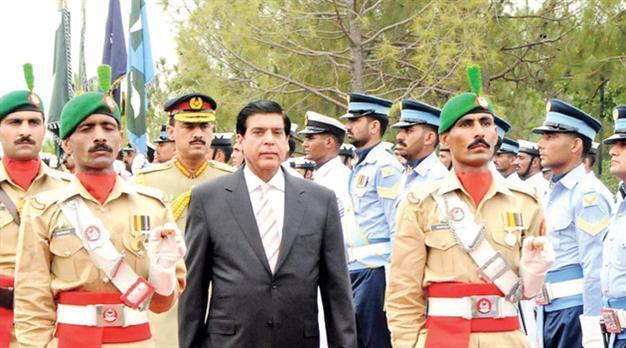Pakistan politics set for showdown
ISLAMABAD

Pakistani PM Ashraf (C) inspects an honor guard during a welcoming ceremony at the Prime Minister’s House in Islamabad. AFP photo
Pakistan’s top court yesterday summoned the new prime minister to appear later this month to face possible contempt charges, the clearest sign yet it could dismiss a second premier in a showdown over corruption cases.The Supreme Court, which disqualified and convicted Prime Minister Yousuf Raza Gilani over the issue, summoned his successor, Raja Pervez Ashraf, on Aug. 7 for ignoring a request to ask Swiss authorities to reopen cases against President Asif Ali Zardari.
It is the latest episode in a two-and-a-half-year saga in which the government has resisted demands to have Zardari investigated, arguing that he enjoys immunity as head of state. The government is due to become the first in Pakistan’s history to complete an elected, full five-year mandate in February 2013, but the showdown could force polls before then.
The court had given Ashraf until yesterday to write to Switzerland and last week struck down a new law passed by Parliament that sought to exempt members of the government from contempt trials, clearing the way for legal proceedings against the premier.
Critics of the judiciary and members of Zardari’s ruling Pakistan People’s Party accuse the court of overstepping its reach and waging a personal vendetta against the president. The government had wanted the case adjourned until September.
Experts say Ashraf will be asked to explain his position on Aug. 27. If the court is not satisfied, he risks being summoned to be indicted for contempt, precipitating the second contempt trial against a sitting prime minister in the space of a few months.
The allegations against Zardari date back to the 1990s, when he and his wife, late Prime Minister Benazir Bhutto, were suspected of using Swiss bank accounts to launder $12 million allegedly paid in bribes by companies seeking customs-inspection contracts.
The Swiss shelved the cases in 2008 when Zardari became president and the government insists the president has full immunity as head of state. But in 2009, the Supreme Court overturned a political amnesty law that had frozen investigations into the president and other politicians, ordering that the cases be reopened.
Zardari had already signed the contempt law, which sought to exempt government figures, including the president, prime minister and Cabinet ministers from contempt for acts performed as part of their job.
Analyst Imtiaz Gul told Agence France-Press that the decision showed the court was refusing to back down. “The logical consequence of the court’s position is the disqualification of any prime minister who refuses to write the letter,” he said.
















